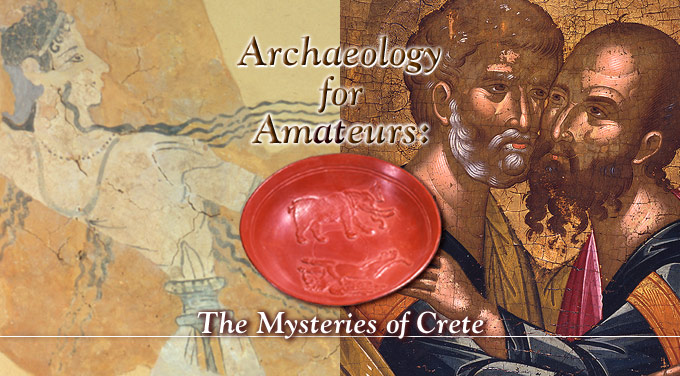

Archaeology for Amateurs: The Mysteries of Crete is an introduction for novices to the methods and approaches of archaeology. It focuses on the island of Crete – in particular, a region of Crete called Sphakia – and it handles excavation, field survey and art history. The course covers three main epochs: Prehistoric, Graeco-Roman and Medieval-Modern ranging in date from ca. 3000 BC to AD 1900.
A team of archaeologists and other specialists from Canada, the US, and the UK conducted a survey of Sphakia, a rugged area in SW Crete. The project is co-directed by Lucia Nixon (Oxford) and Jennifer Moody (Texas) with additional senior participation from Simon Price, project historian (Oxford), and Oliver Rackham, botanist and historical ecologist (Cambridge). The purpose of the Survey was to investigate the interaction between people and the landscape of Sphakia over a period of some 5000 years. Part of the Survey’s final publication is on the Web:
The Sphakia Survey Web site
After the publication of the website, Lucia Nixon and Simon Price were approached to author an online course on the subject for the Alliance for Lifelong Learning, in association with Technology-Assisted Lifelong Learning (www.tall.ox.ac.uk). The Alliance (www.allLearn.org) is a partnership between Oxford, Yale and Stanford universities, and is aimed at their alumni, who pay to take a range of courses at a set time, with the guidance of an online tutor.
This version, however, is offered free to current members of the University of Oxford (those who use the ox.ac.uk domain). Because the course was developed for delivery via the Prometheus learning platform, as used by the Alliance, some of the additional features will not work. For instance, you will see references to the Discussion Forums, generally from the Pause and Reflect activities, but please note that neither these nor support from the Alliance are available
We hope that the course will be useful for a variety of papers in Archaeology, Classics and History which require an introduction to archaeological methods, or make use of case studies on the relationship between archaeology and history. It will also be of interest to those with a passing interest in Crete who wish to learn more.
The course makes frequent reference to some extra material:
Colin Renfrew and Paul Bahn. (2000) Archaeology: Theories, Methods and Practice, 3rd edn. London: Thames and Hudson. [in many Oxford libraries]
Jeffery Pike. (2001) Insight Guide: Crete, 5th edn. APA Publications Insight Guide. [not on OLIS]
The Sphakia Survey Video (1995). [copies may be obtained from karen.carey@admin.ox.ac.uk]
The course also makes full use of our Sphakia Survey website: http://sphakia.classics.ox.ac.uk
Continue to: Course outline
These pages are from a course designed for the Alliance for Lifelong Learning Web site, with an associated online discussion forum, and other functionality, and any references to these should be ignored.